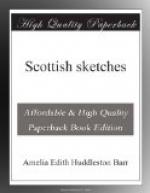Just after this interview a little lad put a note in John’s hand from Margaret Fae. It only asked him to be on Brogar Bridge at eight o’clock that night. Now Brogar Bridge was not a spot that any Orcadian cared to visit at such an hour. In the pagan temple whose remains stood there it was said pale ghosts of white-robed priests still offered up shadowy human sacrifices, and though John’s faith was firm and sure, superstitions are beyond reasoning with, and he recalled the eerie, weird aspect of the grim stones with an unavoidable apprehension. What could Margaret want with him in such a place and at an hour so near that at which Peter usually went home from his shop? He had never seen Margaret’s writing, and he half suspected Sandy Beg had more to do with the appointment than she had; but he was too anxious to justify himself in Margaret’s eyes to let any fears or doubts prevent him from keeping the tryst.
He had scarcely reached the Stones of Stennis when he saw her leaning against one of them. The strange western light was over her thoughtful face. She seemed to have become a part of the still and solemn landscape. John had always loved her with a species of reverence; to-night he felt almost afraid of her beauty and the power she had over him. She was a true Scandinavian, with the tall, slender, and rather haughty form which marks Orcadian and Zetland women. Her hair was perhaps a little too fair and cold, and yet it made a noble setting to the large, finely-featured, tranquil face.
She put out her hand as John approached, and said, “Was it well that thou shouldst quarrel with my father? I thought that thou didst love me.”
Then John poured out his whole heart—his love for her, his mother’s demand of him, his quarrel with Ragon and Peter and Sandy Beg. “It has been an ill time, Margaret,” he said, “and thou hast been long in comforting me.”
Well, Margaret had plenty of reasons for her delay and plenty of comfort for her lover. Naturally slow of pulse and speech, she had been long coming to a conclusion; but, having satisfied herself of its justice, she was likely to be immovable in it. She gave John her hand frankly and lovingly, and promised, in poverty or wealth, in weal or woe, to stand truly by his side. It was not a very hopeful troth-plighting, but they were both sure of the foundations of their love, and both regarded the promise as solemnly binding.
Then Margaret told John that she had heard that evening that the captain of the Wick steamer wanted a mate, and the rough Pentland Frith being well known to John, she hoped, if he made immediate application, he would be accepted. If he was, John declared his intention of at once seeing Peter and asking his consent to their engagement. In the meantime the Bridge of Brogar was to be their tryst, when tryst was possible. Peter’s summer dwelling lay not far from it, and it was Margaret’s habit to watch for his boat and walk up from the beach to the house with him. She would always walk over first to Brogar, and if John could meet her there that would be well; if not, she would understand that it was out of the way of duty, and be content.




